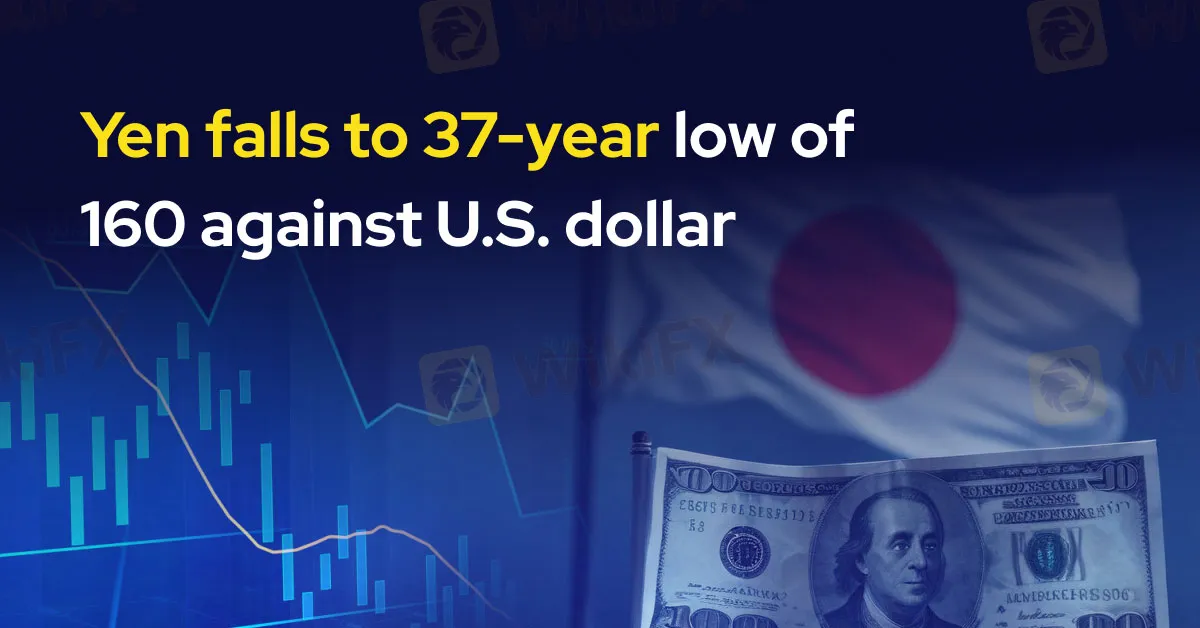简体中文
繁體中文
English
Pусский
日本語
ภาษาไทย
Tiếng Việt
Bahasa Indonesia
Español
हिन्दी
Filippiiniläinen
Français
Deutsch
Português
Türkçe
한국어
العربية
Yen falls to 37-year low of 160 against the U.S. dollar
Abstract:The Japanese yen plummeted below 160 against the US dollar on Wednesday, marking its weakest position in over 37 years. The steep decline has sent shockwaves through Tokyo, prompting urgent discussions on intervention strategies to stabilize the currency.

The Japanese yen plummeted below 160 against the US dollar on Wednesday, marking its weakest position in over 37 years. The steep decline has sent shockwaves through Tokyo, prompting urgent discussions on intervention strategies to stabilize the currency.
The yen's descent below the critical 160 threshold occurred amidst heightened concerns raised by Japanese and South Korean economic forecasters earlier this week. The situation escalated further after the United States added Japan to its watch list for currency manipulation, intensifying global scrutiny.
During London trading hours, the yen touched 160.39 against the dollar, a level unseen since 1986. The alarming drop triggered swift action from Japan's central bank on April 29, when the yen first breached the 160 mark, prompting immediate intervention measures.
Masato Kanda, Japan's vice finance minister, conveyed deep apprehension over the yen's rapid depreciation, emphasizing the government's vigilant monitoring of market trends and readiness to implement necessary countermeasures. “We have a serious concern about the recent rapid weakening of the yen,” Kanda stated, underscoring the urgency of the situation in remarks reported by Bloomberg.
The Japanese government has already committed substantial resources to curb the yen's freefall, spending approximately $61.3 billion in interventions between April 26 and May 29. These efforts involved selling treasuries to stabilize the currency amidst volatile market conditions.
Earlier attempts to bolster the yen, such as the Bank of Japan's first interest rate hike in 17 years in March, have not yielded the desired results. Despite these measures, the yen has continued to struggle against the strengthening US dollar, posing significant challenges for Japan's economic stability and global trade competitiveness.
As Tokyo deliberates on its next steps to address the currency's unprecedented decline, global markets remain attentive to developments that could impact broader economic landscapes. The yen's trajectory in the coming days will likely influence policy decisions in Japan and reverberate across international financial markets, underscoring the interconnected nature of global economies amidst evolving geopolitical dynamics.

Disclaimer:
The views in this article only represent the author's personal views, and do not constitute investment advice on this platform. This platform does not guarantee the accuracy, completeness and timeliness of the information in the article, and will not be liable for any loss caused by the use of or reliance on the information in the article.
Read more

Common Tactics Used in Online Trading Fraud Today
Know the top online trading scams of 2025, from fake apps to pump-and-dump tricks. Simple tips to spot and avoid them, keeping your money safe in this easy guide.

U.S. March ISM Manufacturing PMI Released
The U.S. March ISM Manufacturing PMI data shows that manufacturing has contracted for the first time, and investors should pay attention to future changes and impacts on the sector.

Breaking News! Forex Inflows Surge to $17 Billion
Nigeria's foreign exchange inflows saw a significant increase in the fourth quarter of 2024, reaching $17.39 billion. This growth reflects strong foreign investments and export revenues, bringing new confidence to the market.

Should You Beware of Forex Trading Gurus?
Know the reality behind forex trading gurus, examining their deceptive tactics, inflated promises, and the risks associated with trusting them for financial advice.
WikiFX Broker
Latest News
Exposing the Top 5 Scam Brokers of March 2025: A Closer Look by WikiFX
Gold Prices Climb Again – Have Investors Seized the Opportunity?
Webull Launches SMSF Investment Platform with Zero Fees
Australian Regulator Warns of Money Laundering and Fraud Risks in Crypto ATMs
FCA Warns Against 10 Unlicensed or Clone Firms
CySEC Warns Against 14 Unlicensed Investment Websites
Top Currency Pairs to Watch for Profit This Week - March 31, 2025
Will natural disasters have an impact on the forex market?
Philippines Deports 29 Indonesians Linked to Online Scam Syndicate in Manila
The Withdrawal Trap: How Scam Brokers Lure Victims into Paying More
Currency Calculator







